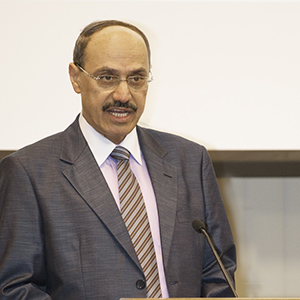Macroeconomic Management in an Oil Economy: The Case of Saudi Arabia
On Wednesday, 16 February 2011, HE Dr Muhammad bin Sulaiman Al-Jasser, Governor of the Saudi Arabian Monetary Agency (SAMA), delivered a lecture on 'Macroeconomic Management in an Oil Economy: The Case of Saudi Arabia' in the Examination Schools at Oxford University. The lecture focused on the challenges of managing the Saudi economy, particularly the unpredictability of oil revenues, economic diversification and employment, food-price inflation, and the response of Saudi Arabia's financial system to the global economic crisis. Following the lecture Dr Al-Jasser took answers from the audience.
Saudi Arabia has about a quarter of the world's proven reserves, sales of which constitute about 80 per cent of its government revenue. While estimates suggest these reserves will last for another seventy years, management of oil revenue is highly volatile, with the result that management of the budget 'risks channelling this volatility to the non-oil sectors of the economy'. Dr Al-Jasser described the 'counter-cyclical' fiscal policy Saudi Arabia used to minimize this risk. When oil revenues are low, the government runs budget and external deficits, and can issue debt to supplement revenues; when revenues are high, however, the government runs a budget and external surpluses, and pays back its debt.
Dr Al-Jasser was appointed Governor of SAMA in 2009; he was recently voted 'Central Bank Governor of the Year' for his prudent stewardship of Saudi Arabia's banking sector. Before delivering his lecture, His Excellency visited the new building of the Oxford Centre for Islamic Studies on Marston Road.

